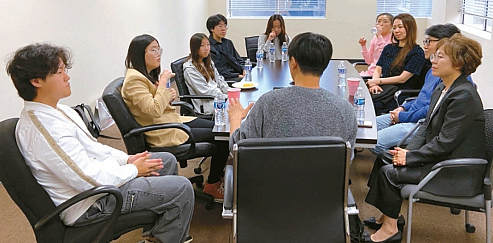Parents and Youths Grapple with Intergenerational Gaps at Mental Health Roundtable
The story was co-published with The Korea Daily as part of the 2024 Ethnic Media Collaborative, Healing California.

Korean-American youth and their parents shared their thoughts at a roundtable discussion.
Nicole Chang, The Korea Daily

On March 16, The Korea Daily hosted the “Korean American Parent-Teenager Mental Health Roundtable: Understanding Each Other’s Minds” with the National Youth Community Center (NYCC), a Korean-American youth service organization.
The panels represented the views of 1.5 to second generation Korean-American youth and first-generation immigrant parents. The purpose of the event was to shed light on the gap between first-generation immigrant parents and second-generation children and to broaden inter-generational understanding.
The youth panel consisted of Kim Ilun (Crescenta Valley High School 12th grade, immigrated to the US at age 13), Olivia So (Harvard-Westlake 11th grade, 2nd-Generation), Ian Hong (Loyola High School 11th grade, 2nd-Generation), Alexandria Jung (Granada Hills Charter School 11th grade, 2nd-Generation), Grace Song (Walter Reed Middle School 6th grade, 2nd-Generation)
The parent panel had the following participants: Yang Yujin (children in 11th grade, homemaker), Julia Jung (children in college 1st year, 10th grade, 5th grade, social worker), Song Inseo (child in 6th grade, pastor), Lydia Yoon (children in 8th grade, 2nd grade, self-employed)
We asked the panels to share their thoughts honestly.
The participating youth expressed how grateful they were for their parents’ dedication but resented their lack of interest in life outside of school. Parents, on the other hand, were unwavering in their belief that their children should study first to become well-rooted in the United States.
The biggest stress: studying
Ian Hong (11th grade): “Korean parents usually put a lot of pressure on their kids to study, and I hate the culture of comparing myself to my peers. I understand that they emphasize studying because our first-generation parents grew up in a difficult situation and they don’t want us to pass that on to us, but my non-Korean friends have a lot of freedom and time to play at school, and if I hang out with my friends even once, my parents tell me to stop playing and study.”
Alexandria Jung (11th grade): “I wish Korean parents would trust their kids more. Even if I spend four or five hours studying in the library with my friends, my mom will say, ‘Did you go out with your friends?’ It makes me feel resentful.”
Julia Jung-parent: “When my child meets a friend, the first thing I ask is, ‘Is s/he good at studying?’ If the friend is good at studying, it’s okay. But if my child’s friend is not good at studying and misbehaving, I get nervous.”
Lydia Yoon-parent: “Students should fulfill the duty of doing well in school. As a kid of minority, I consistently advise my children, ‘If you excel in your studies and possess the necessary skills, you’ll have the freedom to pursue your desired career anywhere,’ and ‘your academic achievements will influence your ability to follow your chosen path in the future.'”
My friends vs. your friends
Julia Jung: “My first and second children are both daughters. I feel worried when Korean American kids dress strangely. When I think my daughter is influenced by her friends, I say, ‘Maybe you should stay away from her a little bit. In Korea, if you show your belly button or wear a tank top to school, you’re labeled as a delinquent or a troublemaker.'”
Ian Hong: “Korean parents often ask, ‘What country is that kid from?’ I don’t really understand why they ask like that.”
Lydia Yoon: “I’m a little biased. I feel worried when my child hangs out with friends from immigrant families from countries with difficult economic and social conditions.”
Olivia So (11th grade): “My American friends come from different backgrounds, and they are loved by their parents. I wish my Korean parents would be more open-minded about my friends.”
Talking back vs. asking questions
Kim Ilun (12th grade): “In Korea, we are taught to be polite to adults and are taught through indoctrination, so our parents think of talking back as disrespect or rebellion. We want to ask questions and talk to them. In the U.S., parents and children are more equal, like friends, and there are no prejudices. My American friends talk back to their parents a lot, and American parents listen to their children.”
Julia Jung: “I feel like my child is rebelling when I hear them talking back to me. I want them to do what I tell them to do.”
Ian Hong: “Koreans emphasize table manners. Eating quietly and not talking has become a habit. Even at school, I usually don’t say anything. I once went to a friend’s house in the U.S. and was jealous when I saw my friend talking a lot with his parents while eating. I wish we could do that at home.”
Lydia Yoon: “My kids are very opinionated. Even if I say it is right, they keep arguing back, so we end up arguing with each other, which leads to a bad relationship. Later on, I realized that my children are getting an American education (that emphasizes expression).”
Song Inseo-parent: “When my kids talk back to me, I sometimes say, ‘Mom and Dad are not your friends.’ My wife and I were international students when we first met. It’s a little difficult for us to teach them American-style parenting because we don’t have the experience of American teenage life.”
Alexandria Jung: “I think we have a different ‘mindset’ than Korean parents as Korean parents think they are above their children, but in the American style, everyone is ‘equal.’ When we talk back, it’s not about arguing, it’s about communicating with each other."
This Korea Daily project is supported by the USC Annenberg Center for Health Journalism, and is part of “Healing California,” a yearlong reporting Ethnic Media Collaborative venture with print, online and broadcast outlets across California.
